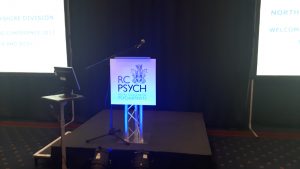17 March 2017 marked the day of the Royal College of Psychiatrists (RCPsych) Northern and Yorkshire (N&Y) Division Spring Conference. The theme of this year’s conference was ‘Mind, Brain, and Body’, exploring the complex connections and effects that each has on the others. Clinicians at different stages of their careers all gathered for what was to be a truly informative and thought provoking day, featuring presentations on a variety of topics including addictions neurobiology, medically unexpected symptoms, and the uses of neuroimaging in psychiatry.
 The day began with riveting presentations from three psychiatry trainees who had undertaken new projects with the aim of promoting the specialty. The winning presentation was given by Dr Paul Cooper, who led a project called Think Psychiatry, which aims to change perceptions among medical students about psychiatry as a specialty. Dr Cooper explained that that there is still a prominent recruitment crisis in psychiatry which exceeds that of other specialties in medicine, as up to 11% of consultant posts and 20% of training posts are unfilled. Dr Cooper outlined some startling statistics: of those who responded to the survey, 54% of the general public did not believe that psychiatrists hold a medical degree. The Think Psychiatry project had 18 sessions in its first year, which were held in two local trusts on FY1 and FY2 training days. The programme was successful in that it improved people’s views on how important psychiatry was to the multidisciplinary approach of medicine, however it did not make people consider going into the specialty, with only 3-6% of medical students and doctors choosing psychiatry as a first choice career. Future aims for the programme include rolling it out to first year medical students, providing more information on the specialty and helping to reduce the recruitment crisis.
The day began with riveting presentations from three psychiatry trainees who had undertaken new projects with the aim of promoting the specialty. The winning presentation was given by Dr Paul Cooper, who led a project called Think Psychiatry, which aims to change perceptions among medical students about psychiatry as a specialty. Dr Cooper explained that that there is still a prominent recruitment crisis in psychiatry which exceeds that of other specialties in medicine, as up to 11% of consultant posts and 20% of training posts are unfilled. Dr Cooper outlined some startling statistics: of those who responded to the survey, 54% of the general public did not believe that psychiatrists hold a medical degree. The Think Psychiatry project had 18 sessions in its first year, which were held in two local trusts on FY1 and FY2 training days. The programme was successful in that it improved people’s views on how important psychiatry was to the multidisciplinary approach of medicine, however it did not make people consider going into the specialty, with only 3-6% of medical students and doctors choosing psychiatry as a first choice career. Future aims for the programme include rolling it out to first year medical students, providing more information on the specialty and helping to reduce the recruitment crisis.
The next speaker was Professor Else Guthrie from the University of Leeds who gave a talk entitled ‘Medically Unexplained Symptoms: The Conversational Model of Therapy’. Professor Guthrie explained the link between somatic symptoms and mental illnesses such as anxiety and depression, and posed the idea that feelings are a combination of physical and mental processes. She then went on to explain how the language used by both the psychiatrist and the patient is vital during therapy; that to get a true understanding of the patients’ feelings and experience, digressive language must not be used, and the need for a personal relationship and understanding between clinician and patient.
Dr Wendy Burn and Dr Gareth Cuttle presented The Gatsby Foundation and Wellcome Trust Neuroscience Project, which is a full review of the MRCPsych curriculum. Aims of the two-year initiative include incorporating the most up-to-date neuroscience knowledge, equipping trainees for the future advances in the field, and creating new training materials.
Professor Peter White, Emeritus Professor in Psychological Medicine at Barts and the London Medical School, presented ‘What does Chronic Fatigue Syndrome tell us about psychiatry?’, looking at misdiagnosis in CFS and the effect of psychological co-morbidities. Physiologically, he explained that CFS patients often suffer from low heart rate variability and sympathetic nervous system overdrive when they are asleep, as well as central nervous system sensitisation. He also explained the number of psychological mechanisms which contribute, such as fear avoidance, catastrophising and negative perfectionism, leading to burnout.
Overall, being around so many great and influential minds in the world of psychiatry, and getting to converse with them regarding various issues has allowed me to see how far the practice of psychiatry has come. However, we still have a distance to go to eliminate the stigma that surrounds the profession in order for psychiatry to truly be respected among the specialties.
The next RCPysch N&Y conference will take place on Friday 29 September 2017 at York Racecourse, with the theme of Stress & Trauma. Tickets are £10 for all medical students and FY1 doctors.
 Blessing Fabowale-Makinde is a second year medical student at HYMS with an interest in psychiatry. In her spare time she enjoys cooking, going to the gym and learning Italian.
Blessing Fabowale-Makinde is a second year medical student at HYMS with an interest in psychiatry. In her spare time she enjoys cooking, going to the gym and learning Italian.

